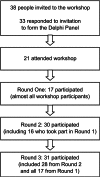Principles for research on ethnicity and health: the Leeds Consensus Statement
- PMID: 22552261
- PMCID: PMC3662014
- DOI: 10.1093/eurpub/cks028
Principles for research on ethnicity and health: the Leeds Consensus Statement
Abstract
Background: There is substantial evidence that health and health-care experiences vary along ethnic lines and the need to understand and tackle ethnic health inequalities has repeatedly been highlighted. Research into ethnicity and health raises ethical, theoretical and methodological issues and, as the volume of research in this area grows, so too do concerns regarding its scientific rigour and reporting, and its contribution to reducing inequalities. Guidance may be helpful in encouraging researchers to adopt standard practices in the design, conduct and reporting of research. However, past efforts at introducing such guidance have had limited impact on research practice, and the diversity of disciplinary perspectives on the key challenges and solutions may undermine attempts to derive and promote guiding principles.
Methods: A consensus building Delphi exercise--the first of its kind in this area of research practice--was undertaken with leading academics, practitioners and policymakers from a broad range of disciplinary backgrounds to assess whether consensus on key principles could be achieved.
Results: Ten key principles for conducting research on ethnicity and health emerged, covering: the aims of research in this field; how such research should be framed and focused; key design-related considerations; and the direction of future research. Despite some areas of dispute, participants were united by a common concern that the generation and application of research evidence should contribute to better health-care experiences and health outcomes for minority ethnic people.
Conclusion: The principles provide a strong foundation to guide future ethnicity-related research and build a broader international consensus.
References
-
- Gill PS, Kai J, Bhopal RS, Wild S. Health Care Needs Assessment: Black and Minority Ethnic Groups. In: Raftery J, editor. Health Care Needs Assessment: The Epidemiologically Based needs Assessment Reviews. Abingdon: Radcliffe Medical Press Ltd; 2007.
-
- Nazroo JY, Jackson J, Karlsen S, Torres M. The black diaspora and health inequalities in the US and England: does where you go and how you get there make a difference? Soc Health Illness. 2007;29:811–30. - PubMed
-
- Black Sir Douglas (Chair) Inequalities in Health: Report of a Research Working Group. London: Department of Health and Social Services; 1980.
-
- Acheson Sir Donald (Chair) Independent Inquiry into Inequalities in Health. London: The Stationery Office; 1998.
-
- Department of Health. Tackling Health Inequalities. London: HMSO; 2003.
Publication types
MeSH terms
Grants and funding
LinkOut - more resources
Full Text Sources
Miscellaneous


